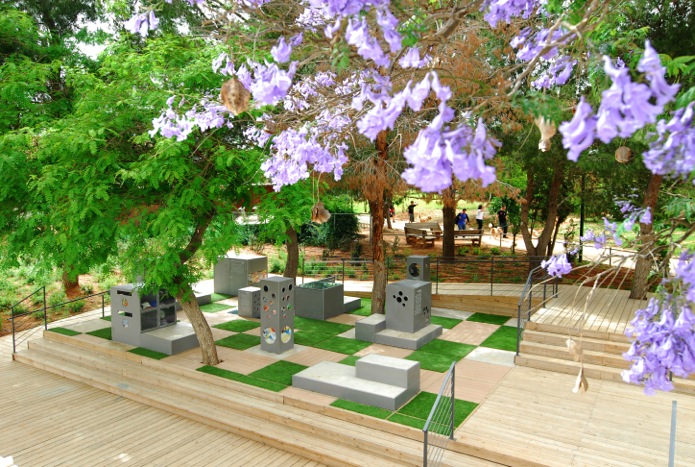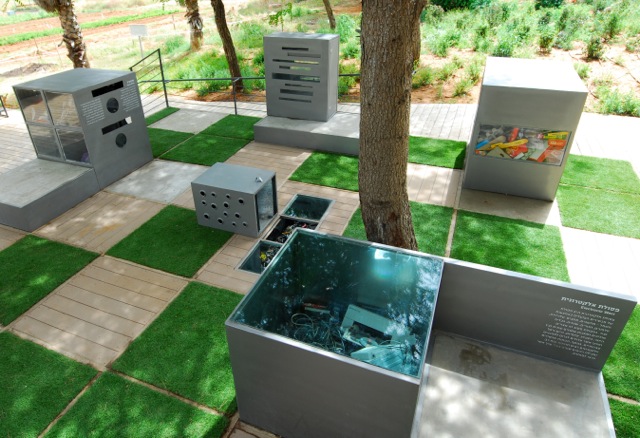Educational Urbanism- Urban Design’s role in teaching in the city

Ian Banerjee describes ‘Educational Urbanism’ as current phase, and perhaps even an emerging discipline where urban planning, educational planning and pedagogy join forces for teaching in cities.
We believe Educational Urbanism could mean be more than that. Design has social role, and architects have a responsibility towards society. Educational Planning, therefore, should be a basic approach towards urban design, and become an inherent part of the practice. Educational Urbanism could be part of any intervention in the urban landscape- adding value to the design, enhancing it with content, and providing it with local, social and cultural depth.
“Recycling Park”– a recent work of ours (designed and built by SAYA, Twig Architecture and Shluliyot), can illustrate what we mean by “Educational Urbanism”. This garden- as a concept and a design was developed by us for the Urban Farm in Kfar Saba, an educational facility dedicated to teaching school children about farming, agriculture, nature and environment.
Today, we must teach children issues which we ourselves had not been taught- amongst them making them aware of material cycles, of the importance and practices of recycling, and of various ways in which they could re-use waste. The Municipality’s wish to design a facility or a workshop for doing so was therefore an exciting opportunity for us.
We believe that children learn best through play, engagement and experience, and the Recycling Park brings these forms of learning into the public realm. It demonstrates that education does not need to stop at the classroom door, but can happen anywhere in the city. The Park provides a playful urban environment that raises curiosity and encourages discovery while educating for change. The garden is designed on a playful grid, from which containers emerge. Each container is uniquely shaped, hints on what is held within it, and bears a short explanation describing the importance of recycling each of the materials. The containers also offer playful openings at various heights – for inserting waste and taking it out for re-use purposes, and for allowing children of various heights to do so. The built benches around each container offer seating and places for activities, allowing the site to be more than an educational display and function as an outdoor classroom.
Since its inauguration, the Recycling Park has been operating as a teaching environment for an array of activities relating to waste and recycling. The site regularly hosts school children, teachers, instructors, city citizens and visiting groups. In addition, the design has inspired a set of site-specific activities developed by teachers, combining play and investigation. These demonstrate that practicing Educational Urbanism can create more than rich and innovative environments- it can become a catalyst for new forms of teaching in cities.
“Recycling Park” is a winner of the Israeli Design Awards, 2012.






Temporary mobile numbers offer safety, confidentiality, and flexibility in many online and offline scenarios. This piece describes why using temporary contacts is important for individuals and businesses.
Protection against fraud and spam
Temporary phones aid prevent financial crime and junk calls. When you use a temporary phone, your main number stays confidential, lowering the possibility of ID theft and phishing.
Enhancing privacy in registrations
Many online services require a mobile during signup. Using a temporary digit preserves your personal details confidential, and blocks unauthorized monitoring by advertisers or third parties https://jareddcwo26150.canariblogs.com/het-belang-van-tijdelijke-telefoonnummers-een-diepgaande-verkenning-42151096
Safer communication for short-term needs
For reselling items, meeting people, or one-time projects, temporary lines allow secure communication without long-term commitment. After the exchange ends, you can delete the contact.
Business and operational benefits
Companies can use temporary numbers for campaigns, customer support, or testing. Temporary digits deliver scalability, easy tracking of campaigns, and protection of core customer service lines.
Compliance and legal considerations
In some regions, regulations require phone verification. Temporary lines support businesses to comply while reducing exposure of customer data. However, ensure compliant use and check regional rules to avoid misuse.
Cost efficiency and manageability
Temporary numbers are often cost-effective than long-term contracts and more straightforward to manage. They minimize overhead for short campaigns, testing, or seasonal operations.
Conclusion
Temporary phone numbers provide a valuable tool for safeguarding privacy, reducing fraud, and improving operational flexibility. Used carefully, they help both individuals and organizations in a world where communication and data safety are crucial.